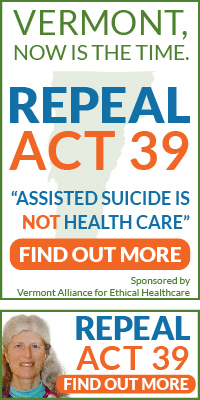With debate on S.108, the fake fix for Vermont’s assisted suicide law, Act 39, about to begin, the Vermont Alliance for Ethical Health Care has issued the following press release.
FOR IMMEDIATE RELEASE - April 29, 2015
from: Vermont Alliance for Ethical Healthcare (VAEH) - Advocacy Director Guy Page, 802-505-0448, [email protected]
The Vermont Alliance for Ethical Healthcare (VAEH), a coalition of doctors, other medical professionals, people with disabilities, and many other Vermonters in opposition to doctor-assisted death, call for the repeal of Act 39 on the floor of the Vermont House during the scheduled debate of S-108 this week, beginning this afternoon. The following will be distributed today to all legislators:
What we do know about assisted suicide in Vermont Under Act 39:
“The only information that is actually collected that I would stand by is true is the fact that six* Vermonters went through the process with their physician over all the safeguards, and therefore were eligible to receive a prescription. Any other information in terms of how many people took it, how many people were prescribed is really anecdotal and could certainly not be reported as definitively true from my perspective (emphasis added).”
Dr. Harry Chen
Commissioner, Vermont Department of Health
Senate Health & Welfare Testimony, February 18, 2015
(*at 7 prescriptions as of April 15, 2015)
What we don’t know about assisted suicide in Vermont under Act 39
How many people have actually filled the prescription that was written?
How many have taken the lethal prescription?
How many patients have died from their underlying illness without taking the prescription?
What happened to the lethal drugs if the patient died without taking them?
How many patients have outlived their 6-month prognosis?
If the patient was still capable of making a decision at the time the lethal dose was taken?
If the person was able to, and actually did, self-administer the lethal medication?
If the patient was being coerced or pressured at the time the lethal dose was taken?
If a healthcare provider or anyone else is present at the time the lethal dose was taken?
How long it took the patient to die as a result of taking the lethal dose – or if the patient actually did die as a result?
How many patients start the process but don’t complete it because they change their mind or are found to not be capable?
If patients had access to quality medical care and palliative care?
If those receiving lethal prescriptions are bona fide Vermont residents?
If Vermont will see an increase in our general suicide rate, as Oregon has?
How we can prevent suicide contagion in Vermont?
If nurses, pharmacists and others involved have immunity under the law?
How a health care facility can prevent the use of lethal drugs on its premises?
If those seeking a lethal prescription have capacity (which is distinct from being “capable”)?
How instances of potential abuse can be identified and investigated?
If family members know about a patient’s decision to request a lethal prescription?
If a patient truly initiates the process, or if they are pressured because physicians have a duty to inform the patient that assisted suicide is an option?
If a physician has a duty to inform, how can it be said that participation is voluntary?
If the physician who prescribes the lethal dose has any history with the patient, or is just being seen because of a willingness to write a lethal prescription?
If patients who can’t speak for themselves are eligible to request PAS?
How the death certificate is marked - does anything denote that a person died under Act 39?
The perspective of nurses, psychiatrists, and other caregivers opposed to PAS on how Act 39 is working, since the Committee did not take their testimony?
Why this is being done now when the sunset doesn’t go into effect until July 2016?

